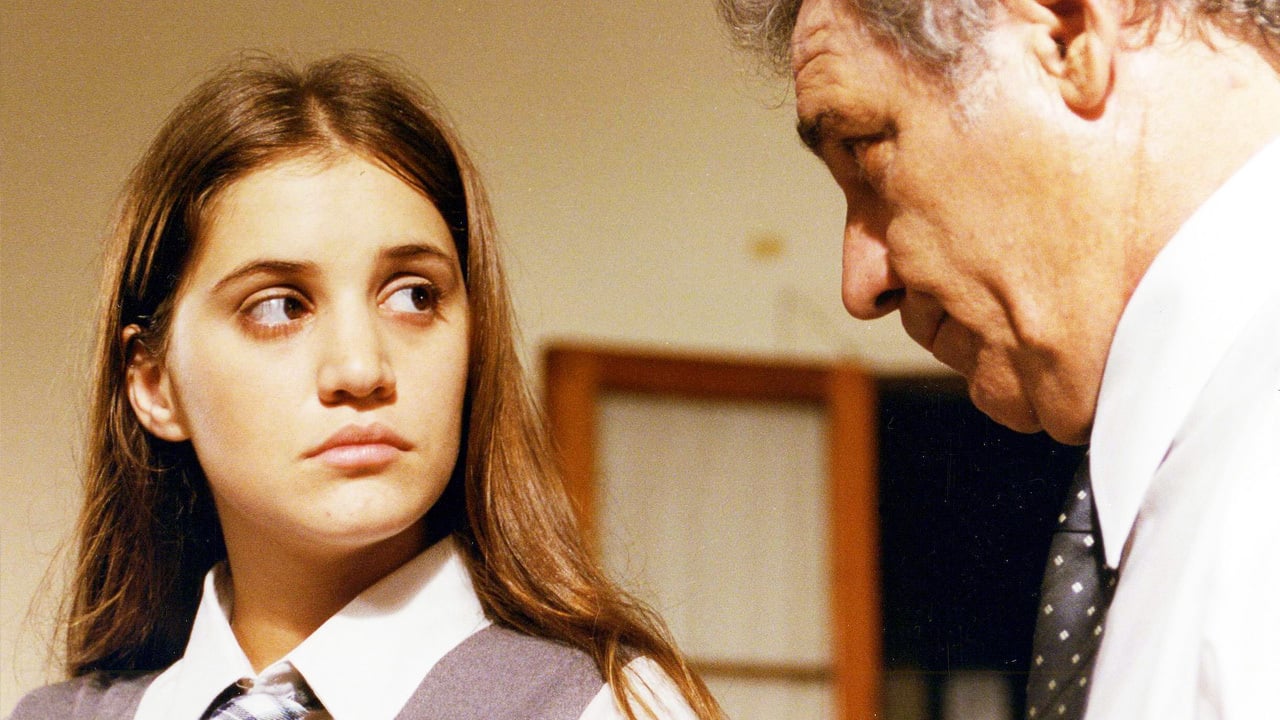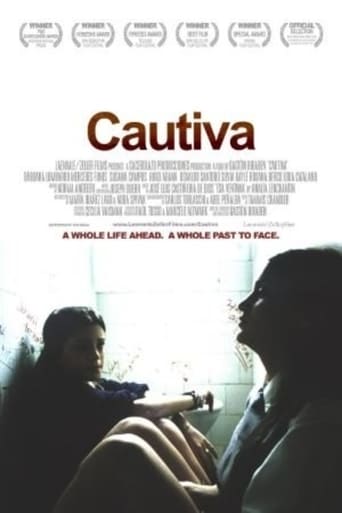



Very disappointed :(
Sadly Over-hyped
It's no definitive masterpiece but it's damn close.
View MoreGood idea lost in the noise
............................................................from Pasto,Colombia...Via: L.A. CA., CALI, COLOMBIA and ORLANDO, FL In English, when we say, "He was DISAPPEARED", we are using a term that came into English from Spanish. Over the past decades, countless thousands have suffered this fate in many South and Central American countries. Cautiva offers us a genuinely fresh take on this somber subject. We see the problem from the perspective of a teenage girl, Cristina Quadri, who one day, without the slightest warning, is yanked out of her class at school and taken to the office of a federal judge. He then proceeds to unravel her world by informing her that her real name is Sofia Lombardi and that her parents were "disappeared" by the dictatorship in power at the time of her birth in 1978. Furthermore, the people who she has called "Mom and Dad" her whole life, are, in reality, her abductors. At first, she is completely incredulous. In a most demanding role, Barbara Lombardo delivers an extremely intense and nuanced performance that is nothing short of awesome. To watch her gradually, step by step, come to terms with the stark and utter tragedy of her reality, is something very few actors could have done so convincingly! Cautiva leaves us contemplating just how profoundly life altering the truth can be. The film, of course, is in Spanish, and as to the quality or speed of the subtitles, I'm sorry, but I don't need them, so I can't offer an opinion.9*.....ENJOY/DISFRUTELA!Any comments, questions or observations, in English o en Español, are most welcome!.....KissEnglishPasto@Yahoo.com
View MoreThis film tells of a young girl Cristina growing up in Buenos Aires, Argentina. One day her life gets turned upside down when court officials escort her from her school and inform her that she is really Sofía Lombardi, daughter of activists who disappeared during the 70s. From there begins a journey of searching for information about her parents and discovering her true identity. "Captive" complements the film "The Official Story" very well and emphasized the importance of historical memory, both for a country and for an individual. Cristina, like Alicia ("The Official Story"), is blissfully living in ignorance of the truth until someone else brings it to her attention. Both female characters are at first doubtful of the fact that so many people simply "disappeared". Their doubt then turns to belief and surprise that they didn't know earlier.
View MoreIn the early scenes it is 1993 and Christina Quadri is at her fifteenth birthday party. Christina attends a Catholic school and enjoys all of the privileges of an upper middle class existence until one day she is called from class to meet a federal judge who informs her that, as a result of DNA testing, it has been determined that her real name is Sofia Lombardi and those who raised her from birth are not her real parents. There are several elements in this film that raise it above the typical entry in the "young person searching for their real parents" genre. For one thing, Christina/Sofia's plight is not the result of such things as mistaken identities at birth, adoption, or insemination by way of a sperm bank, but rather a willful act of what amounts to a government-approved kidnapping. For another thing, Sofia's parents did not die in some accident or suffer some early natural death, but rather were killed as dissidents during the dictatorial rule in the 1976-83 era.The bulk of the film deals with Sofia's coming to terms with her real identity and her search for the grim details of her parents' fate. She is spurred on in her investigative endeavors by her friend Angélica who is in a similar situation. That aspect of the film plays out as a detective story. I wish we could have gotten to know Sofia's real family better than we do so as to better understand her ultimate decision to accept them.Bárbara Lombardo, as Christina/Sofia, is well cast. She has the ability to communicate emotion through facial expression, but is also able to rise to the occasion when venting her frustration and anger in a verbal attack on her would-be parents. The entire cast is good, but I was particularly impressed with Mercedes Funes, who plays Angélica. Funes expertly captures the sadness and defiance of a young woman who has been forced to deal with unpleasant realities and demands to know the truth.There is little doubt about director Gaston Biraben's political intent to expose the malignity and corruption of a repressive regime and it is a testament to his art as a filmmaker, and the power of film-making in general, that he accomplishes his goal by focusing on the personal rather than the historical. As an non-Argentinian this movie encouraged me to do some research and I came away from it with historical knowledge I would otherwise not have had--you cannot say that about many films.
View MoreA political film in the higher sense of the term, it made me put into question many beliefs I had on my country. Isn't this one of the highest functions of Art!? What I liked most is that, although it obviously "has an agenda", I don't think they fall for "defending a political thesis at all costs". Such a common mistake of Argentine cinema on the "desaparecidos"... It's not without defects, thou. A bit "black and white", stereotyped characters. Let me elaborate: the "left wingers" seem to have no defects AT ALL, they're "full of love and high principles". And the "rednecks" are unlawful liers, violent, hypocritical and even ..."ugly"! They could also take bribes to "have all vices"... I mean, yes, characters could be more nuanced, but, given the low average of reality in most other films of the genre, I think this one deserves accolades. Some humour in any way would have helped, I guess. Just a personal opinion. Is there any worse thing than what happens here? I can't think of more than one (murder, in all its forms). I think even rape is "less bad"! Before turning this into a "moral philosophy", let me point at the scenes I liked most: 1) When Sofía and her expressive Spanish friend have this important talk about life, surrounded by soccer. Now as before, quenching everything that matters. The "paralelism" is challenger indeed! 2) Having Ives's "The unanswered question" as a musical score when... (I can't say more!) 3) Final scene (aerial take, Handel?) 4) The shower scene, between the two now women, "naked" in more than one sense 5) The brawl between the Quadris and Sofia. An one moment, Pablo starts treating Sofia as a stranger, almost an enemy. Suddenly, her "dear daughter Cristina" is dead, even before he hits her. (maybe a bit predictable I guess) 6) (you may laugh) "The nightmare". It made me realize true horror is not what Hollywood sells us, it's opening a door into the unknown (in her grandma's or aunt's house) and finding a glimpse of a life frozen in time (her dead mother's). The film luckily avoids many pitfalls. Has only one very unbelievable moment, when a nun's teen escapes from Tribunales, from the same savvy cops who reduce the also hard boiled Pablo Quadri. Tribunales' zone is very WELL FILMED, feels absolutely real to somebody like me who's hanged around there very often. Retiro, the trains, both schools... It's a very Argentine film! By the way, found it great how she "downgraded" economically from her rather posh house in the suburbs to her grandma's "dark old house" & derelict Citroen! The contrast between the nun's school, which is not luxurious but looks like when compared to the truly depressing state school! I was surprised about the performances! Have to say I didn't expect much from this film, for a) I don't like Argentine cinema b) the subject is normally a sign of a tsunami of clichés c) didn't have much faith in Lombardero. When I saw "Hugo Arana" I feared the worst :) I had to gulp my prejudices, they both acted surprisingly subduedly, without overemphasis. I had my "lesson", they taught it to me. I would have liked to know what was being played during the film, I loved the usage of classical music throughout the film (not in just a couple of broken scenes). My kudos to the director, of whom I knew nothing, and who (thanks IMDb!) has been a "sound editor" in mainstream American cinema! Well, I hope he continues to surprise us!
View More